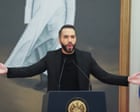
In a turn of legislative and judicial events, transformative changes are unfolding across various regions of the world. These changes speak volumes of shifting political dynamics and important strides in human rights.
In El Salvador, the political landscape experiences a pivotal shift as the nation’s congress has voted to remove presidential term limits. This legislative change sets the stage for President Nayib Bukele to potentially seek re-election without the previous constraints. The decision has sparked a range of reactions, reflecting concerns and varied perspectives on the future trajectory of governance in the country.
Marcela Villatoro, an opposition congresswoman, has expressed profound concerns, interpreting the removal of term limits as a signal of El Salvador veering towards authoritarianism, reminiscent of developments in Venezuela. The legislative decision was passed with a significant majority, as President Bukele’s Nuevas Ideas party commands substantial influence in the congress. Despite fears expressed by some stakeholders, including international observers, the decision presently stands, marking a new phase in El Salvador’s political chronicles.
Meanwhile, in the Caribbean, positive change resonates powerfully with the historic judicial ruling in St. Lucia. The Eastern Caribbean Supreme Court has struck down laws from the colonial era that criminalized consensual same-sex relations, marking a momentous progression for LGBTQ+ rights. This ruling has been embraced by activists and viewed as a progressive stride towards equality and human rights in the region.
The court’s decision underscores an acknowledgment of new social norms and a respect for human dignity, drawing positive responses from advocacy groups both within and beyond St. Lucia. This milestone paves the way for further dialogues on rights and inclusivity in the Caribbean, aligning with growing global trends favoring diversity and equality.
In another region, the plight of Muhammad Zaher Ibrahim, a 16-year-old Palestinian-American, draws attention to issues of human rights and detention practices. Held in an Israeli prison for five months under accusations that his family disputes, Muhammad’s story highlights the ongoing complexities of justice and civil rights in the context of regional conflicts.
Muhammad Ibrahim’s family, along with international advocacy groups, continue to appeal for his release, citing his deteriorating health and the conditions of his detention. The young detainee’s case dovetails into broader discussions and concerns about the treatment of minors in conflict zones, urging pertinent stakeholders to scrutinize and address the humanitarian aspects of such detentions.
As these stories unfold, they reflect the intricate interplay of legal changes, political decisions, and human rights advocacy that shape our current global environment. The developments in El Salvador, St. Lucia, and the plight of individuals like Muhammad underscore the importance of vigilance and advocacy in maintaining and enhancing the facets of democracy and human dignity across diverse cultural landscapes. Each of these narratives contributes uniquely to the evolving discourse on governance, law, and human rights worldwide.
Source: {link}
